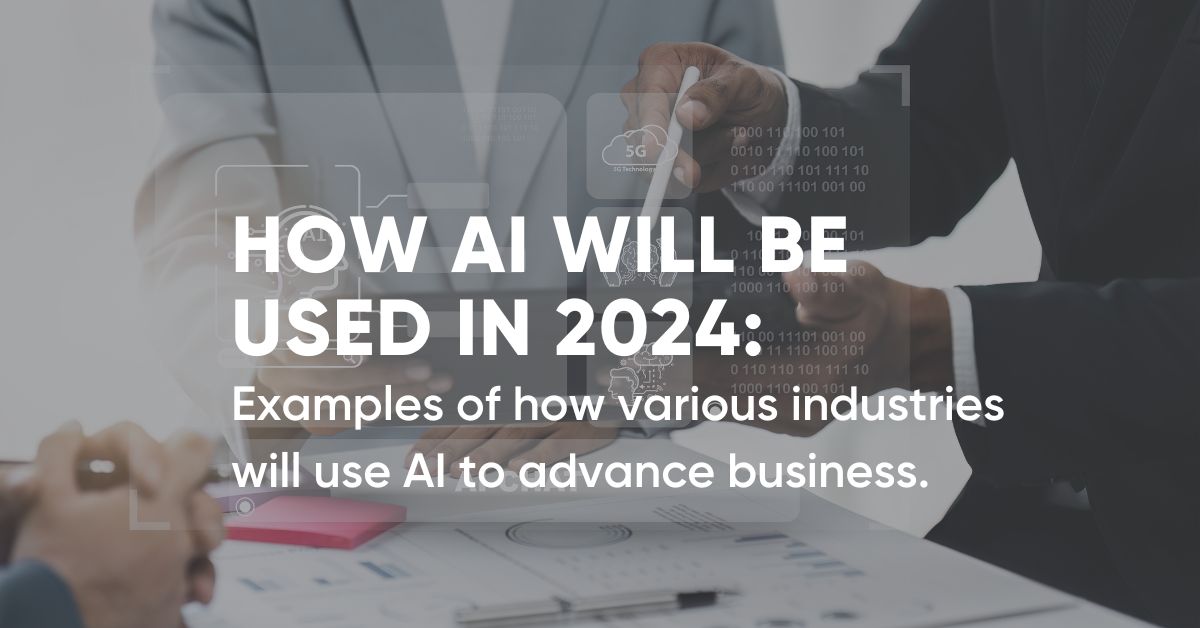As we enter 2024, AI continues to drive innovation and transformation in businesses across multiple industries. From improving customer experiences to enhancing decision-making, AI is poised to play a pivotal role in shaping the future of business. Staying informed about these AI trends and leveraging them strategically will be crucial for organizations aiming to remain competitive and agile in the years to come. Embracing the right AI technology to stay ahead of the curve will be a key factor to business success in 2024 and beyond.
Here are some of the most significant AI trends we predict will transform the business world in the coming year.
AI-Powered Customer Experience
Happy customers spend more and are retained more easily, so it makes sense that enhancing customer experience is becoming even more of a key priority for businesses, and AI is playing a pivotal role in achieving this goal. In 2024, we can expect to see even more personalized and efficient customer interactions, thanks to AI-driven chatbots, virtual assistants, and recommendation engines. These technologies will not only improve customer satisfaction but also streamline customer support operations and boost sales through tailored product recommendations.
Examples of AI tools that will enhance the customer experience include:
- Chatbots/Chat Agents: Chatbots are virtual agents that interact with customers in real-time through chat interfaces on websites or messaging apps. They can answer frequently asked questions, provide product information, and assist with basic problem-solving.
- Virtual Assistants: Virtual assistants like Amazon’s Alexa, Apple’s Siri, and Google Assistant can be integrated into customer service systems to provide voice-based support and information retrieval.
- Natural Language Processing (NLP): NLP technologies are used to understand and analyze customer inquiries, feedback, and reviews. They can help categorize and prioritize customer issues, sentiment analysis, and extract insights from unstructured data.
- Speech Recognition: Speech recognition tools can transcribe and analyze customer calls to assist customer service representatives in real-time. This technology can also be used to automate call routing and provide voice-based self-service options.
- Predictive Analytics: Predictive analytics algorithms can anticipate customer needs and behaviors based on historical data. This can help businesses offer personalized recommendations, predict customer churn, and optimize service processes.
AI-Enhanced Decision-Making
Many businesses have been tracking data for years, but have lacked the technology to create useful insights from that information. Artificial Intelligence is finally closing the gap and taking data-driven decision-making to the next level in 2024. Businesses will increasingly rely on AI algorithms to analyze vast datasets and provide actionable insights. This will enable more informed and data-driven strategic decisions, from supply chain optimization to marketing campaign effectiveness.
Examples of how AI will help businesses make better decisions:
- Data Analysis & Insights: AI can analyze large volumes of data quickly and accurately, extracting meaningful insights and patterns that humans may overlook. This can inform strategic decisions, marketing campaigns, and product development.
- Personalization: AI-powered recommendation systems can provide personalized product or content recommendations to individual customers, increasing engagement and conversion rates.
- Energy Efficiency: AI can optimize energy consumption in buildings and industrial processes by adjusting systems and equipment based on real-time data, reducing costs and environmental impact.
- Supply Chain Management: AI can optimize supply chain operations by predicting disruptions, optimizing logistics routes, and managing inventory levels efficiently, ensuring products are delivered on time and costs are minimized.
- Equipment Health Monitoring: AI monitoring systems can detect early signs of wear and potential issues, reducing unplanned downtime, preventing costly breakdowns, and optimizing maintenance schedules. AI-driven equipment health monitoring helps businesses improve operational efficiency, extend the lifespan of their assets, and reduce maintenance costs, ultimately contributing to higher productivity and profitability.
AI-Driven Automation
Automation has been a significant trend in recent years, and AI will continue to drive this movement in 2024. Robotic Process Automation (RPA) is a technology that uses software robots or “bots” to automate repetitive, rule-based tasks in business processes. Businesses will increasingly adopt AI-powered RPA to streamline repetitive tasks and increase operational efficiency. This will free up employees to focus on higher-value tasks, leading to improved productivity and cost savings.
Examples of how businesses use Robotic Process Automation:
- Data Entry and Data Validation: RPA bots can automate data entry tasks by extracting information from one system or application and inputting it into another. They can also validate data for accuracy and consistency, reducing errors.
- Report Generation: RPA bots can generate standard reports and financial statements by pulling data from various sources, formatting it, and distributing the reports to relevant stakeholders on a scheduled basis.
- Inventory Management: RPA can monitor inventory levels, generate reorder requests, and update inventory records in real-time as items are received or shipped. This helps optimize inventory levels and reduce stockouts or overstock situations.
- Sales Order Processing: RPA can automate the entire sales order processing workflow, from order entry and validation to order fulfillment and invoicing. This accelerates order processing and reduces errors.
- Compliance and Audit: RPA can assist in compliance and audit processes by continuously monitoring transactions and records for compliance with regulations and automatically generating audit reports.
AI for Sustainability
Sustainability is a growing concern for businesses worldwide, and AI can play a significant role in achieving sustainability goals. AI-driven energy management systems can optimize resource usage, reduce waste, and lower carbon footprints. Additionally, AI can assist in supply chain optimization to minimize environmental impacts.
Examples of how businesses use AI to become more sustainable:
- Supply Chain Optimization: AI helps businesses optimize supply chain operations by reducing transportation costs, minimizing excess inventory, and optimizing delivery routes, resulting in reduced fuel consumption and emissions.
- Water Management: AI helps organizations monitor and manage water usage more efficiently. It can detect leaks, optimize irrigation, and reduce water wastage in industrial processes.
- Environmental Monitoring: AI-enabled sensors and satellite imagery can monitor and analyze environmental data, such as air quality, water quality, and deforestation, providing valuable insights for conservation efforts and policy decisions.
- Transportation and Logistics: AI-powered route optimization, autonomous vehicles, and predictive maintenance reduce fuel consumption and emissions in transportation and logistics operations.
- Energy Management: AI is used to optimize energy consumption in buildings and industrial facilities. Smart systems can adjust heating, cooling, and lighting based on occupancy and weather conditions, leading to significant energy savings.
- Waste Reduction: AI-powered sensors and cameras can monitor waste bins and recycling processes, optimizing waste collection schedules and ensuring efficient recycling, reducing landfill waste.
AI-Driven Supply Chain Management
The disruptions caused by the COVID-19 pandemic highlighted the need for resilient and adaptable supply chains. AI offers numerous ways to improve supply chain management for businesses, enhancing efficiency, reducing costs, and ensuring smoother operations.
In 2024, AI will be instrumental in optimizing supply chain operations, from demand forecasting to inventory management. AI-powered logistics solutions will enable businesses to respond swiftly to changes in market conditions and improve overall supply chain resilience.
Examples of how businesses are using AI to for supply chain management:
- Warehouse Management: AI-powered robots and automation systems can optimize warehouse operations by efficiently picking, packing, and sorting items, reducing labor costs and improving order accuracy.
- Risk Management: AI can assess and predict supply chain risks, such as natural disasters, geopolitical events, or supplier financial instability, enabling businesses to develop risk mitigation strategies.
- Quality Control: AI can perform quality control checks by analyzing images and sensor data to detect defects or deviations in manufacturing processes, ensuring product quality.
- Real-time Tracking and Visibility: AI-based tracking systems provide real-time visibility into the movement of goods throughout the supply chain, helping businesses quickly respond to delays or disruptions.
- Compliance and Regulatory Reporting: AI can help businesses stay compliant with regulatory requirements by automating the collection and reporting of data related to customs, tariffs, and trade regulations.
Working with AI Solutions Provider
Collaborating with an AI solutions provider in 2024 is instrumental for businesses looking to successfully implement an AI strategy. These experts bring a wealth of knowledge and experience, helping organizations navigate the complex landscape of artificial intelligence. By partnering with a reputable AI solutions provider, like ClearObject, businesses can access cutting-edge technology, tailor-made solutions, and a deep understanding of industry-specific challenges.
We can assist in every stage of the AI journey, from defining clear objectives and selecting the right AI tools to data preparation, model development, and ongoing optimization. Book an AI Discovery Workshop to find out how to use AI in your business.

